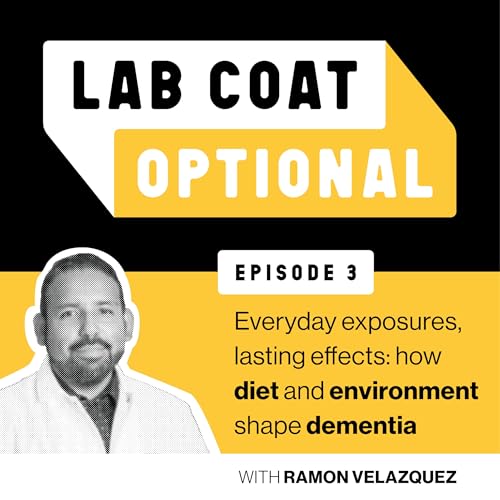
Everyday exposures, lasting effects: how diet and environment may shape dementia, with Ramon Velazquez
Échec de l'ajout au panier.
Échec de l'ajout à la liste d'envies.
Échec de la suppression de la liste d’envies.
Échec du suivi du balado
Ne plus suivre le balado a échoué
-
Narrateur(s):
-
Auteur(s):
À propos de cet audio
This episode we’re diving into the science of memory, aging, and what might be quietly shaping the health of aging minds.
Guest Ramon Velazquez explains what happens in the brain during Alzheimer’s disease and other forms of dementia — and more importantly, what might trigger them in the first place. From essential nutrients to common weedkillers, his research is uncovering how everyday exposures can influence lifelong brain health.
Read more about Ramon’s research on:
- 🧠Low choline levels and Alzheimer's disease
- 🌱Lasting effects of glyphosate on the brain
Learn more about the Biodesign Institute at Arizona State University, the ASU-Banner Neurodegenerative Disease Research Center and Ramon’s lab.
Lab Coat Optional is a production of the Strategic Marketing and Communications team at Arizona State University’s Knowledge Enterprise. Learn more about research and discovery at ASU on Instagram and LinkedIn, or visit us at research.asu.edu.
Love the show? Give us a five star review on the podcast app of your choice! We are at the mercy of the mighty, fickle algorithms and reviews help new listeners find our show.
Do you have thoughts or questions for us? Email us at ke.podcast@asu.edu. We’d love to hear from you! As long as you are nice. Be nice.
Episode credits
Executive produced by Kate Howells
Produced by Alexander Chapin and Pete Zrioka
Hosted and reported by Pete Zrioka
Shot by Alexander Chapin and Christian Van Bebber
Edited by Quinton Kendall
Original music from Patrick Cheung
Motion graphics by Andy Ramos
Art by Andy Keena and Sophia Franz
Research and reporting by Richard Harth
Social media management by Lauren Hebing and Kyler Litson
Keyword research by Aditi Patel
Disclaimer:
Lab Coat Optional is intended for general knowledge and informational purposes only, and does not constitute medical advice. This show does not create a doctor-patient relationship, and the information provided is not a substitute for professional medical diagnosis or treatment. Consult with a qualified healthcare professional for any health concerns or before making any decisions related to your health. In case of a medical emergency, please call 911 or go to the nearest emergency room.
Arizona State University is committed to the ethical and humane treatment of animals in advancing research that benefits humans, animals and the environment. Learn more about ASU’s Animal Care and Use Program.


